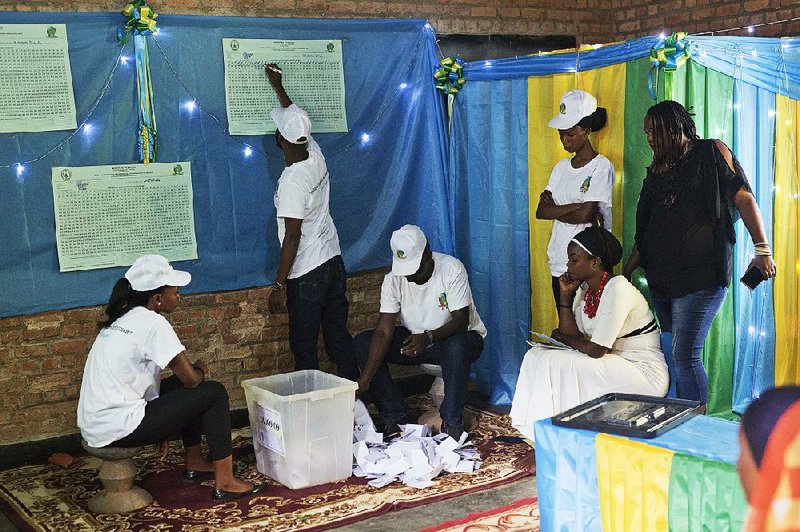KIGALI, Rwanda -- Rwanda's longtime president had 99 percent support with nearly half the ballots counted in Friday's presidential election, according to preliminary results released by the electoral commission.
President Paul Kagame, the 59-year-old who has led Rwanda since his rebels ended the 1994 genocide that left more than 800,000 people dead, said at a campaign rally in July that "the day of the presidential elections will just be a formality."
Provisional results will be announced this afternoon, the commission said. Vote counting was ongoing as of late Friday in Rwanda's capital of Kigali.
Kagame, who won the 2010 election with 93 percent of the vote, was running against Frank Habineza of the Democratic Green Party of Rwanda -- the only permitted opposition party -- and independent candidate Philippe Mpayimana. Three potential candidates were disqualified for allegedly failing to fulfill requirements such as collecting enough signatures to run.
Candidates had been barred from putting campaign posters in most public places, including schools and hospitals. The electoral commission vetted candidates' campaign messages, warning that their social media accounts could be blocked otherwise.
More than 80 percent of Rwanda's 6.9 million registered voters cast their ballots, said Charles Munyaneza, executive secretary of the Rwanda Electoral Commission.
Polling stations in some parts of the capital, Kigali, had long lines on Friday. Kagame made no public remarks after voting there.
While Kagame remains popular for presiding over economic growth, critics accuse him of using the powers of the state to remove perceived opponents.
Rwandan authorities, including Kagame, deny critics' claims that the government targets dissidents for assassination or disappearances.
On Friday, Foreign Minister Louise Mushikiwabo on Twitter mocked a post by Human Rights Watch Executive Director Kenneth Roth, who called the government a "murderous dictatorship."
"Ken, Ken, Ken... You've come off your medication again?" she tweeted, suggesting that he could "get help" at a psychiatric hospital in her country.
A constitutional amendment after a referendum in 2015 allows Kagame to stay in power until 2034 if he pursues it.
"Even the critics will tell you Kagame is an extraordinary leader who walks the talk," Kigali resident Charles Karemera said after voting.
"He is the only candidate with a vision and he will move the country forward," said Monique Mucyeshimana, who'd just cast her vote for Kagame in the Kicukiro district of the capital, Kigali. "No one can replace him right now -- we want him to stay."
In the Kigali district of Gasabo, Jean Herve Habimana said he'd voted for Habineza because of "his clear foreign policy" and vows to make peace with Rwanda's neighbors, close informal detention centers and give quick, fair trials to prisoners.
The country has fraught relations with Burundi, which has been embroiled in a political crisis since 2015 and accuses Rwanda of meddling -- allegations the government denies.
The tiny landlocked nation's economy -- which receives donations from countries including the U.S. and U.K. -- has expanded an average of more than 7 percent a year since Kagame took office in 2000, and is expected to grow 6.1 percent this year, according to the International Monetary Fund.
Its biggest industries and sources of foreign exchange are tea, coffee, tourism and mining.
In its election manifesto, the ruling Rwandan Patriotic Front pledged to create jobs, partner with private companies to encourage new industry, build about 2,361 miles of roads and increase mineral exploration.
Information for this article was contributed by Ignatius Ssuuna of The Associated Press and by Saul Butera of Bloomberg News.
A Section on 08/05/2017
